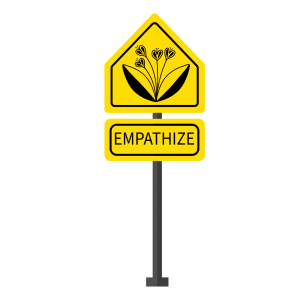Be Curious: Empathy


Empathy is feeling with someone or perspective-taking. Compassion involves an action of some kind. Empathy and compassion are intertwined, but they are different. Empathy is often the gateway to compassion, which motivates and moves us to take action to make a difference. Many of us find it easier to offer compassion to others than to extend it to ourselves. Yet research indicates that those who practice self-compassion have a greater sense of well-being, resiliency, and more robust mental health.
Self-compassion is about extending compassion to oneself in instances of suffering, perceived inadequacy, or failure. As humans, we tend to ignore our pain and discomfort. However, unprocessed pain festers and grows, impacting our perceptions and interactions with the world. In essence, ignoring the pain has the opposite effect of what we want. Alternatively, when we treat ourselves with self-compassion, we create space to normalize and process pain. We are better able to learn from the pain and move past it.
Many of us have learned to speak unkindly to ourselves when we struggle or make mistakes. Sometimes, we even have an unspoken belief that being hard on ourselves will motivate us to change or improve. The opposite is true. Speaking unkindly to ourselves has to do with our “Inner Critic.” We have all been on the receiving end of negative, critical comments. Our subconscious remembers and holds these critical comments, even if our conscious mind forgets. These negative comments can show up in the form of our “Inner Critic,” which is that tape that plays critical comments in your head when you mess up.
Inner Critic Reflection
- What kinds of messages does your Inner Critic give you?
- Have you discovered any effective ways to quiet your Inner Critic?
We can learn to practice self-kindness to shift power away from our Inner Critic. Instead of just listening to the negative tapes that play in our heads, we can choose to change the tone of our self-talk. Instead of speaking like your Inner critic, decide to speak in the tone of your Inner Coach.
Inner Coach Reflection
- How would your Inner Coach speak to you?
- Can you think of some positive, encouraging things others have said to you in the past?
- How can you remind yourself to speak with the tone of an Inner Coach, instead of the Critic?
When considering your future, it is important to practice empathy, quiet your inner critic, and channel your inner coach.
Video: Empathy by IDEO.org [1:25] Standard YouTube License transcripts available at YouTube
Attribution
“Self-Compassion – An Overview” from Post-Secondary Peer Support Training Curriculum by Jenn Cusick is licensed under a Creative Commons Attribution 4.0 International License, except where otherwise noted. Modifications: excerpts taken and summarized.

